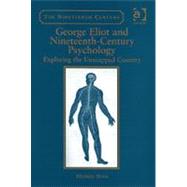
Note: Supplemental materials are not guaranteed with Rental or Used book purchases.
Purchase Benefits
Looking to rent a book? Rent George Eliot and Nineteenth-Century Psychology: Exploring the Unmapped Country [ISBN: 9780754651727] for the semester, quarter, and short term or search our site for other textbooks by Davis,Michael. Renting a textbook can save you up to 90% from the cost of buying.
| General Editors' Preface | vi | ||||
| Acknowledgements | vii | ||||
| Introduction | 1 | (10) | |||
| 1 The Mind and Body | 11 | (36) | |||
|
14 | (12) | |||
|
26 | (21) | |||
| 2 The History of the Self: The Formation of Mind | 47 | (40) | |||
|
52 | (17) | |||
|
69 | (18) | |||
| 3 The Possibilities of Emotion | 87 | (32) | |||
|
89 | (3) | |||
|
92 | (5) | |||
|
97 | (6) | |||
|
103 | (10) | |||
|
113 | (6) | |||
| 4 The Will, Consciousness, the Unconscious | 119 | (42) | |||
|
122 | (7) | |||
|
129 | (5) | |||
|
134 | (13) | |||
|
147 | (14) | |||
| 5 The Science of 'Spirit': The Mind and Religious Experience | 161 | (28) | |||
|
164 | (6) | |||
|
170 | (3) | |||
|
173 | (7) | |||
|
180 | (9) | |||
| Conclusion: 'Separate yet Combined' | 189 | (8) | |||
| Bibliography | 197 | (10) | |||
| Index | 207 |
The New copy of this book will include any supplemental materials advertised. Please check the title of the book to determine if it should include any access cards, study guides, lab manuals, CDs, etc.
The Used, Rental and eBook copies of this book are not guaranteed to include any supplemental materials. Typically, only the book itself is included. This is true even if the title states it includes any access cards, study guides, lab manuals, CDs, etc.